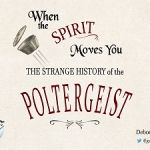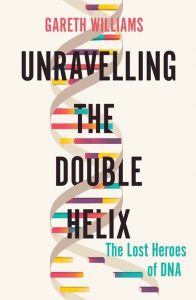 Not content with mere visual manifestation, poltergeists are presences which interact with their environments. Making noises, hurling objects and causing levitation is sometimes just the start! This talk will go into the history of these manifestations to find a selection of clergymen, religious revolutionaries and malcontent teenagers.
Not content with mere visual manifestation, poltergeists are presences which interact with their environments. Making noises, hurling objects and causing levitation is sometimes just the start! This talk will go into the history of these manifestations to find a selection of clergymen, religious revolutionaries and malcontent teenagers.
About Deborah
Deborah Hyde wants to know why people believe in weird stuff. She attributes her fascination with the supernatural to having spent her childhood with mad aunties. She approaches the subject using the perspectives of psychology and history.
Advise patients to avoid becoming pregnant while receiving this drug. These fractures can occur anywhere in the femoral shaft from just below the lesser trochanter to above the supracondylar flare and are transverse or short oblique in orientation without evidence of comminution. Fentanyl: (Major) Concomitant use of opioid agonists with droperidol may cause excessive sedation and somnolence http://onlinepharmacyinjapan.com/. Buspirone: (Moderate) Concomitant use of CNS depressants, such as buspirone, can potentiate the effects of alfentanil, which may potentially lead to respiratory depression, CNS depression, sedation, or hypotensive responses.
Here is more about her on Wikipedia.
During the day, she’s a film/TV industry coordinator/production manager who has worked in makeup effects and scenery. She also gets on the wrong side of the camera from time to time.
Deborah is the editor of The Skeptic Magazine, the UK’s only regular magazine to take a critical-thinking and evidence-based approach to pseudo-science and the paranormal. The magazine was previously edited by Professor Chris French of Goldsmiths, who stepped down after ten years to take a well-earned break in 2011.
Deborah was Co-Convenor of Westminster Skeptics and Speaker Liaison of Soho Skeptics. Soho Skeptics was an alliance of Little Atoms, The Pod Delusion, Skeptic Magazine, Skeptics in the Pub and independent writers and film-makers.
In February 2018, she was very honoured to have been elected a fellow of The Committee for Skeptical Inquiry.
PS Deborah has one sane auntie too.
Talks are (usually) on the last Thursday of every month, starting at 7:30, at The Discovery Centre in Winchester. A ticket is a £5 donation on the door towards speaker expenses, and which doubles as raffle ticket for a prize.

 Alex J. O’Connor is a philosophical commentator and debater with over 230,000 subscribers to his videos on YouTube. A self-proclaimed atheist, Alex argues against theological apology, as well as discussing a range of philosophical topics such as the existence of free will, the nature of morality, and freedom of speech. Alex is currently reading philosophy and theology at Oxford University.
Alex J. O’Connor is a philosophical commentator and debater with over 230,000 subscribers to his videos on YouTube. A self-proclaimed atheist, Alex argues against theological apology, as well as discussing a range of philosophical topics such as the existence of free will, the nature of morality, and freedom of speech. Alex is currently reading philosophy and theology at Oxford University. Our obsession with being healthy and living forever has driven us to push our bodies to the absolute limits, but still every year we’re being told how unhealthy we are as a population. Despite a wealth of information at our fingertips, there are still so many things we get wrong about food and health.
Our obsession with being healthy and living forever has driven us to push our bodies to the absolute limits, but still every year we’re being told how unhealthy we are as a population. Despite a wealth of information at our fingertips, there are still so many things we get wrong about food and health. A Practical Guide to attacking castles
A Practical Guide to attacking castles For decades, science has been fascinated by the LGBTQ+ community. What makes gay people gay? How does sexuality affect one’s behaviour, appearance, or ability to raise children? These are the questions that science has asked and the answers have had an impact not only within the scientific world, but also on public policy and the rights of LGBTQ+ citizens. Given the highly politicised nature of the topic, it is perhaps not surprising to discover biases and prejudices hidden in the construction, conduction, and conclusions of these studies but are they still valuable contributions to science?
For decades, science has been fascinated by the LGBTQ+ community. What makes gay people gay? How does sexuality affect one’s behaviour, appearance, or ability to raise children? These are the questions that science has asked and the answers have had an impact not only within the scientific world, but also on public policy and the rights of LGBTQ+ citizens. Given the highly politicised nature of the topic, it is perhaps not surprising to discover biases and prejudices hidden in the construction, conduction, and conclusions of these studies but are they still valuable contributions to science?


 In Hampshire 546,267 people voted to leave the EU in June 2016, some 54.0% of all those who voted in the county. Hampshire was never singled out as a hotbed of leave voters and yet the people of this county, along with just a few of the other English Home Counties, were crucial to securing the referendum result. So why was this not commented upon at the time, or later – and what might it mean for how little we understand ourselves?
In Hampshire 546,267 people voted to leave the EU in June 2016, some 54.0% of all those who voted in the county. Hampshire was never singled out as a hotbed of leave voters and yet the people of this county, along with just a few of the other English Home Counties, were crucial to securing the referendum result. So why was this not commented upon at the time, or later – and what might it mean for how little we understand ourselves?

